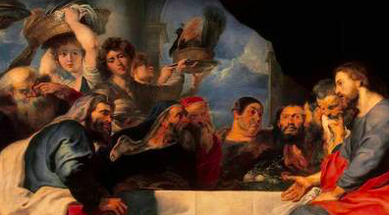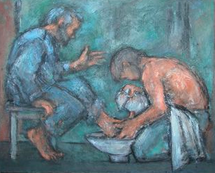 “For this reason many among you are weak and sick, and a number sleep” (1 Corinthians 11:30). Many, if not most, come to this verse (v. 30) in the 1 Corinthian 11 version of the Lord’s Supper written by Paul to the church at Corinth (11:23-32), and with little or no exegetical or contextual consideration, nor historical examination, take the “weak and sick” and “a number sleep” to mean the “unworthy” (v. 27) who had partaken of the Eucharist. In other words, they, then, had received some form of judgment (i.e., becoming weak, sick, and worse, die). More specifically, many also take these as non-Christians that have eaten the Lord’s Supper in an unworthy manner. This reading is also used as a rationale to discourage nonbelievers from partaking in the Lord’s Supper during a worship service each week. There is, however, a better, and more likely, reading of this important text. 1) The reference to “sleep” is a biblical euphuism for Christians that have died, not unbelievers—so, this verse is not a proof-text for non-believers who have “wrongly” partaken of the Eucharist. It is believers who have fallen asleep (died). And as far as I can tell, there is no exegetical reason the "weak," "sick," and the sleeping must be "the unworthy" of verse twenty-seven. Additionally, the term “weak” in Paul’s 1 Corinthian context also, usage-wise, points to believers. (See #3 for whom those who are the "weak," "sick," and asleep are within the Letter context and social location.) 2) The “meal” was a central element in the apostolic church gatherings and was so in the early church period for about 150 years after Pentecost (and continued in some form for another 150 years through about 300 AD). 3) There is a likely famine (or period of severe food scarcity; e.g., Suetonius, Claud. 18.2; Josephus, Ant. 3.320-21) that researchers have discovered or recognized had occurred at the time in the surrounding area, which would have made the meal issue a central concern (especially, if the poor in the congregation was not even finding food for themselves “at church,” let alone on the marketplace). 4) The occasion of the Letter itself is instructive, namely there is an elite-ism (which affirms the Roman social structure and association or social etiquette) that found its way to the meal or banquet component of the church gathering, which would have occurred just prior to the sharing of the cup of remembrance (of the Lord Jesus’ death) and the symposia or instruction time. 5) Verse 33 ought not be ignored in that it directly suggests that some were not allowed or welcomed or accepted or or re-classified to a different "spot" at the meal or simply shoved out of the meal (demonstrating the etiquette of the Empire and not the etiquette of the Kingdom of God). The primary instruction is, not to end the meal component of the gathering, but to wait for all to eat (v. 33) and thus reflect the social etiquette of the gospel. Plus, it is to those who eat before or at the expense of the poorer, less socially acceptable Christians that are told to eat at home (v. 34); still no instruction to end the meal/banquet as a form of the church's gathering for worship, instruction, and fellowship. Non-Christians are not in the purview for the correction and admonition here, but the Christian elites and status seekers. A more likely reading of verse 30 (For this reason many among you are weak and sick, and a number sleep) is that the “weak,” “sick,” and the sleeping (i.e., the dead) are, not non-Christians, but the poor and less acceptable Christians of the church at Corinth. There were those in the congregation who were sick and some had passed away (possibly) as a result of the famine, which was only made worse by the pushy elite Christians who stormed the meal ahead of or in spite of the poorer, less socially acceptable members of the body of Christ. If not as a result, then most certainly the reference to the weak, sick, and sleeping are a kingdom-reminder of why table fellowship was of such importance (the poor and marginal received a form a assistance, i.e., in this case food). The fellowship meal in the Corinthian form was not affirming the gospel. This is what Paul is addressing.
0 Comments
We know that Jesus left his disciplesus with a “new commandment,” which we read and hear in John 13: “A new commandment I give to you, that you love one another, even as I have loved you, that you also love one another. By this all men will know that you are My disciples, if you have love for one another” (John 13:34-35).  We are familiar with this “new command,” yet at more so the sentimental level. We, however, need allow the context of the story surrounding this command to “love one another to fill the content of this love--the purpose of this love. There are plenteous commands regarding love and loving one's neighbor; so, why is this one particularly a "new" command? When Jesus was bidding his disciples farewell, for his time, that is his demise, was approaching—the time when the King of kings would be betrayed by a close friend; the time when the promised Messiah would face a rigged and illegal trail by those threatened by his very presence; the time when the Messiah-Rabbi-Discipler would be abandoned by the very ones he had trained; and, the time when the Prince of life would be hung on a Roman cross as a traitor and criminal--he gave some final instructions. Have you noticed that this new command to love one another is given within the context of betrayal.
Reading through Acts, the Luke's inspired volume of the early days of the apostles, we don’t see a whole lot of foot-washing and, as well, no such instruction is addressed in the Epistles to the churches. So what are we to make of following Jesus’ example? Why, then, is Jesus' final instructions important to the early church and for us now? The example seems instructive for a community with now leverage and no platform for its message. Perhaps the instruction is an ironic means of survival and endurance--a preventative measure and an embedded community habit against alignment with those who would be betrayers of Messiah and the brethren, inside and out. The following episode, the conversation between Jesus and Peter, is the first “test case.” Typically the focus is on Peter’s misplaced sense of humility, that is, his desire to prohibit Jesus from washing his feet. This foil links Peter to the betrayal framing (noted above), for we read, after Peter’s “wash all of me” over-reach (v. 9), Jesus immediately refocuses on Judas’ betrayal (vv. 10-11). The ensuing exchange between Jesus and Peter solidifies this “betrayal” direction (cf. v. 11). The table fellowship around the final meal where Jesus is the host puts Judas in the place of honor, sitting to Jesus’ side (i.e., his immediate left or right depending on the side of the table Jesus actually sat on and as Jewish tradition informs us). We are, then, in a sense (at least figuratively) sitting in that place of honor (because that's where we seek to be, is it not?). We seek to sit in the place of honor, only to be reseated elsewhere after the host arrives and the meal has begun; the place where Peter and John’s mother wanted them seated next to Jesus, but alas it was reserved for someone else: Judas, the betrayer. Then, after Jesus reveals the betrayer to John and Peter (vv. 21-29) and prior to the “new command,” we hear Jesus explain: “Therefore when he had gone out, Jesus said, ‘Now is the Son of Man glorified, and God is glorified in Him; if God is glorified in Him, God will also glorify Him in Himself, and will glorify Him immediately. Little children, I am with you a little while longer. You will seek Me; and as I said to the Jews, now I also say to you, ‘Where I am going, you cannot come’” (vv. 31-33). Then, Jesus immediately launches into what fulfills the example of the foot washing: “A new commandment I give to you, that you love one another, even as I have loved you, that you also love one another. By this all men will know that you are My disciples, if you have love for one another” (vv. 34-35). Pause long here enough to note, Peter does not hear the “new commandment.” What did the brazen, self-righteous future pillar of the church hear? The glory. Jesus mentions “glory” fives times in the space of two verses (vv. 31-32). Peter and the apostles focused on the grand movement of glory associated with Jesus, the promised Messiah and King. And, what? We can’t go with you? This is exactly what Peter hears and responds to: “Simon Peter said to Him, “‘Lord, where are You going?’” (v. 36). Peter does not hear, “Love one another.” He hears “glory.” He wants the “glory.” Judas’ place of honor at the table as it were. Jesus reveals that, even, Peter can be aligned with the betrayer. For, in fact this is exactly what Jesus implies when he challenged Peter's rash, bravado.
|
AuthorChip M. Anderson, advocate for biblical social action; pastor of an urban church plant in the Hill neighborhood of New Haven, CT; husband, father, author, former Greek & NT professor; and, 19 years involved with social action. Archives
February 2024
Categories
All
|
Pages |
More Pages |
|
 RSS Feed
RSS Feed